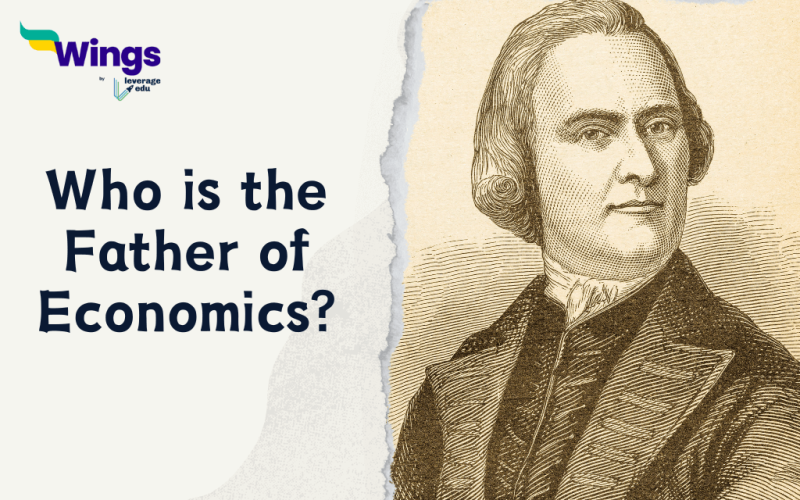Adam Smith, an 18th-century Scottish thinker, earned the title “Father of Modern Economics.” His influential book, “The Wealth of Nations,” laid the groundwork for economic theory. Smith championed free markets, where supply and demand dictate prices, believing this would naturally generate wealth for a nation. His ideas, though debated, continue to shape economic thought today. Let us get to know more about who is the father of economics, his early life, notable achievements, and more with the help of this blog.
Table of Contents [show]
Adam Smith’s Early Life
Adam Smith was born on June 5th, 1723, in Kirkcaldy, Scotland, and was raised by his mother, Margaret Douglas. His father died when he was very young. Some more information about his early life is as follows:
- At the age of 13, he studied at the University of Glasgow.
- He studied European literature at Balliol College, Oxford University.
- After his return to his home, his series of lectures at Glasgow University made him the first chair of logic in 1751 and then the chair of moral philosophy in 1752.
- In his years as an instructor at Glasgow, Smith also worked to publish a few of his lectures. In 1759, his book, The Theory of Moral Sentiments, was finally released.
- In 1763, he moved to France to become a personal tutor to the stepson of Charles Townshend, who was an amateur economist.
- Smith considered philosophers David Hume, Voltaire, and Benjamin Franklin to be his contemporaries while he was living in France.
Also read: Sudha Murthy Biography: Life, Books and Achievements
Notable Achievements and Accomplishments
Over his life, the father of economics, Smith accomplished some great achievements, including the following:
- The Theory of Moral Sentiments was published in the year 1759.
- After retiring to his birthplace of Kirkcaldy, Scotland, following his return from France, Smith published his most influential work, An Inquiry into the Nature and Causes of the Wealth of Nations (shortened to The Wealth of Nations), in 1776.
- Smith, in his book, also formed the basis of classical economics
- Building on Smith’s research, other economists strengthened classical economic theory, which remained the main economic theory during the Great Depression.
- His ideas are also evident in the works of David Ricardo and Karl Marx in the 19th century.
- The idea of free markets: He has emphasized the idea of minimizing the role of government intervention and taxation.
- The idea of the invisible hand: According to which he defined a wealthy nation as one that is populated with citizens working productively to better themselves and their financial needs.
- Idea of wealth and the production of goods: He took the example of labour as the motivating factor and evolution of wealth, which is made possible by the division of labour.
- The Wealth of Nations’ concepts: Revolutionized the import and export industry and served as the inspiration for the idea of the gross domestic product (GDP). Countries declared their wealth according to the value of their gold and silver reserves prior to the publication of The Wealth of Nations.
Also read: Meet 5 Economists Who Transformed American History
Smith’s Legacy
Smith’s ideas are still prominent in the 21st century in modern economic theory; his theory of the invisible hand and division of labor are the fundamental economic principles till now. Although Smith was well-known for being concerned about inequality in general, he was a supporter of the idea that the labor of the poor is a crucial indicator of how well an economy is doing. Like Smith, Karl Marx was a political economist and social philosopher who drew heavily from The Wealth of Nations and expanded upon it. While Smith claimed that capitalism was the best system for fostering economic expansion, Marx thought that capitalism ultimately led to citizen inequality and greed and would collapse on its own.
FAQs
Adam Smith is renowned for his work, “The Wealth of Nations,” published in 1776, which laid the foundation for modern economics. He introduced concepts such as the invisible hand, advocating for free markets and minimal government intervention. Smith also highlighted the significance of the division of labour, which enhances productivity and economic growth.
Smith’s ideas revolutionized economic theory, influencing classical economists like David Ricardo and Karl Marx. His ideas of free markets and limited government intervention shaped policies and economic systems globally. The concept of the invisible hand, suggesting that individuals pursuing self-interest can unintentionally benefit society, remains a fundamental principle in economics.
Adam Smith’s theories continue to hold relevance in contemporary economics. The principles of free markets, division of labour, and the invisible hand still guide economic policy and discourse worldwide. However, debates persist regarding the balance between market freedoms and government regulation, reflecting ongoing discussions on inequality, globalization, and economic development.
| Greatest Writers of All Times | Nobel Laureates of India: 1902-2019 |
| Dr Sarvepalli Radhakrishnan Biography, Education, & Contribution in Teacher’s Day | Interesting Facts about the GOAT: Lionel Messi |
Hope this blog on who is the father of economics. Adam Smith was able to bring forward some of the great contributions made by him in the field of economics. For more informative blogs, follow us Leverage Edu
 One app for all your study abroad needs
One app for all your study abroad needs















 45,000+ students trusted us with their dreams. Take the first step today!
45,000+ students trusted us with their dreams. Take the first step today!
